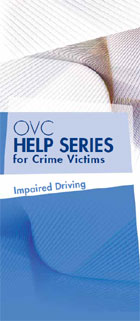 The Facts About Impaired Driving
The Facts About Impaired Driving
In 2009, 10,839 people were killed in crashes involving alcohol-impaired drivers in the United States.1
In 2009, the holidays on which alcohol-related crashes represented the highest percentage of total fatalities were Memorial Day (42 percent), New Year’s Day and the Fourth of July (40 percent each), and Labor Day (38 percent).2
About 3 in every 10 Americans will be involved in an alcohol-related crash at some time in their lives.3
In 2009, an average of 1 alcohol-related fatality occurred every 48 minutes in the United States.4
In 2009, 14 percent of child traffic fatalities—181 deaths—were caused by alcohol-impaired drivers.5
In 2009, 32 percent of traffic fatalities involved drivers with a BAC of 0.08 grams per deciliter or higher. An additional 6 percent involved drivers with a BAC of between .01 and .07 grams per deciliter.6
Alcohol and other drugs, when used in excess or incorrectly, impair driving by altering the brain’s ability to function. Vision and depth perception become distorted, coordination is slowed, and judgment is negatively affected. A driver commits the crime of impaired driving whenever his or her ability to safely operate a vehicle is impaired by the effects of illegal drugs, prescription medications, or over-the-counter medications, or by having a blood alcohol concentration (BAC) of 0.08 grams per deciliter or higher.
Victims of impaired driving crashes are not hurt accidentally. They are victims of a crime that is the result of two choices made by a driver: (1) to use alcohol or other drugs incorrectly or in excess, and (2) to operate a vehicle (a car, motorcycle, boat, jet ski, etc.) while under the influence of these substances. These choices are as dangerous to the public as using a deadly weapon and can be just as lethal.
Impaired driving is a senseless crime because it can be prevented. Thanks to the work of Mothers Against Drunk Driving (MADD), Students Against Destructive Decisions (SADD), and other grassroots victim advocacy groups, public awareness of intoxicated or impaired driving as a preventable crime has grown. Groups like MADD were formed to support victims of drunk driving, reduce the number of deaths and injuries resulting from impaired driving crashes, and advocate for tougher legislation.
If you or a loved one is a victim of an impaired driving crime, you may be affected emotionally and physically. For injured victims and family members of those killed or injured, often the most difficult step is to begin processing what has happened. If a loved one has been killed, this sudden, traumatic death probably feels unlike any other loss you have ever experienced. Coming to terms with such profound grief will take time.
The injustice of the death and involvement with the criminal justice system as a result of the crime may complicate your grief. If the case is treated as an accident by the offender, rather than a crime resulting from the offender’s choice to drive while impaired, you may feel even more angry and frustrated.
Everyone has a different way of processing grief and loss, and everyone does so in their own timeframe. You may experience extreme swings in emotion. You may feel guilty for not being able to protect your loved one even though the crime and its consequences were beyond your control. You may feel depressed or hopeless. The emotions you experience may seem to use up all of your energy.
This emotional suffering may also affect your physical routines. Your eating habits may change. You may have difficulty sleeping or be unable to sleep at all. You may have nightmares about the crash or have difficulty riding in or driving an automobile. You may lose interest in activities you once enjoyed. You may have lingering physical injuries, which can serve as painful physical reminders of your emotional pain.
Victims of impaired driving crashes cope with the profound loss and changes in their lives differently. But no matter how they grieve, most victims of impaired driving crashes are, after a time, able to face life with new understanding and meaning.
Advocates can provide you with information and a full range of victim support services. Victim assistance programs and trained professionals can help you learn about crime victims’ rights in your state. You may want to call your local or state MADD chapter to seek counselors who understand the grief that follows this kind of loss and trauma. Such organizations may also provide support through court accompaniment and advocacy services.
When a loved one has been injured or killed, the financial impact can compound your sense of loss. The costs of medical care, phone bills, counseling, lost wages, and funerals can be overwhelming. All states have crime victim compensation programs that reimburse victims’ families for certain out-of-pocket expenses, including funeral, counseling, and medical expenses, and lost wages. Many states provide emergency funds that are available within weeks of the crash. To be eligible for compensation, the crime must be reported to the police, and the victim and victim’s family must cooperate with the criminal justice system.
Victim assistance programs in your community can provide you with compensation applications and additional information.
Mothers Against Drunk Driving
1-800-GET-MADD or 1-800-438-6233
www.madd.org
National Center for Victims of Crime
202-467-8700
www.ncvc.org
National Organization for Victim Assistance
1-800-TRY-NOVA or 1-800-879-6682
www.trynova.org
Students Against Destructive Decisions
1-877-SADD-INC (723-3462)
www.sadd.org